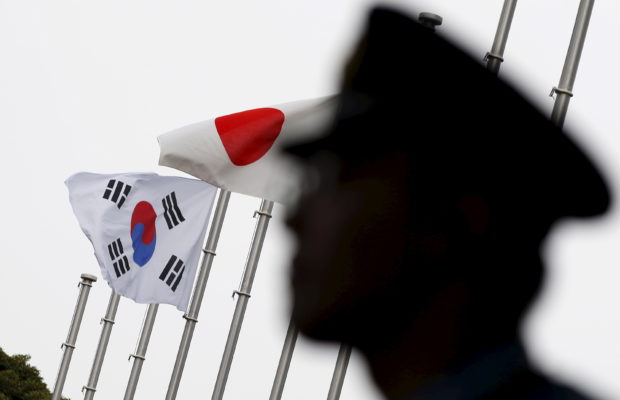Palawan solon: Current economic policy hinders Koreans to invest in PH

FILE PHOTO: Flags are flown at a hotel in this file photo taken on June 22, 2015. REUTERS/Toru Hanai
MANILA, Philippines — Out of 343 South Korean investors, only three went here because of the Philippines’ supposed restrictive economic policies, Palawan 2nd District Rep. Jose Alvarez said on Wednesday.
Alvarez in a press briefing at the House complex said this information was relayed to him by the Korean Ambassador to the Philippines Lee Sang-hwa, who also mentioned during their lunch meeting that the 340 investors went to Vietnam.
According to the solon, this might already be enough reason to amend the 1987 Constitution.
“I will quote the Korean ambassador, I had lunch with him the other day. He said out of the 343 Korean investors, only three located in the Philippines, 340 went to Vietnam. Isn’t that a sufficient reason for us to look at opening the economy?” Alvarez asked.
“We’re lagging behind the rest of ASEAN. That’s what I have to say,” he added.
Article continues after this advertisementAlvarez also said that existing Philippine laws like the Public Service Act are not enough to attract foreign investments, because the Philippines does not allow majority ownership for foreigners. In contrast, he said that Vietnam — which is a communist state — allows the use of lands for a fixed period even if these belong to the government.
Article continues after this advertisement“The laws passed aimed at opening-up the economy, it’s not enough. That’s a very direct answer, because in other countries, for example in Vietnam, there is no foreign ownership of land because in a communist state, all lands belong to the state,” he said.
“But there is a definitive period of 25 years, 50 years, 75 years, then these are the benefits. This is what you invest, these are who you employ. It’s complete already. It’s not like opening the economy through Retail Trade Law, the Public Service Act, that’s not enough,” he noted.
Bataan 1st District Rep. Geraldine Roman said that she respects the views of people against economic charter change, but it might also be important to listen to potential investors.
“They would know the challenges that they face before investing in our country. And you know of course we respect former Justice (Antonio) Carpio he’s a man of great experience. But between theory and practical, practically you know and real talk, just like what we always say, listen to the investors,” she said.
“I think it doesn’t take much to be observant and compare our situation and that of other countries. Sabi nga nila we have a constitution that is so specific and unfortunately it is too specific when it comes to the economic provision,” she added.
Earlier, similar views were made by former Finance Secretary Margarito Teves, who said during the Congressional Policy and Budget Research Department (CPBRD) roundtable forum that the Philippines is lagging in terms of allowing foreign ownership, even behind left-leaning Vietnam.
Teves said he and the Foundation for Economic Freedom — which he represented in the discussions — support moves to amend restrictive economic provisions in the 1987 Constitution.
“We are the most restrictive in ASEAN and Vietnam, which has made substantial liberalization, is the least restrictive. We are No. 3 globally,” Teves said in the forum.
“Remove those from the Constitution. We are the only country in Asean and perhaps in the entire world with those restrictions in the Constitution,” he added.
READ: PH has most restrictive foreign investment rules in Asean – Teves
The House leadership has been making a strong push for amending the 1987 Constitution, reasoning out that restrictive economic provisions hinder growth for the country.
READ: Economic Cha-cha to boost PH’s investment appeal, says solons
However, the House and the Senate have been at odds over economic charter change discussions. Last January 23, all 24 senators signed a manifesto rejecting the People’s Initiative (PI) — a mode of amending the constitution pursued by private groups.
Some senators accused the House leadership of being behind PI, saying that the campaign intends to abolish the Senate by introducing joint voting on the proposed constitutional amendments.
READ: House leaders say there’s no plan to abolish Senate, now pushing RBH 6
Speaker Ferdinand Martin Romualdez and other House leaders have denied being behind the PI, saying several times that they do not intend to abolish the Senate.
Several lawmakers also reiterated that they were willing to pursue amendments through a constituent assembly as contained Resolution of Both Houses No. 6 — where two Houses of Congress would vote separately.